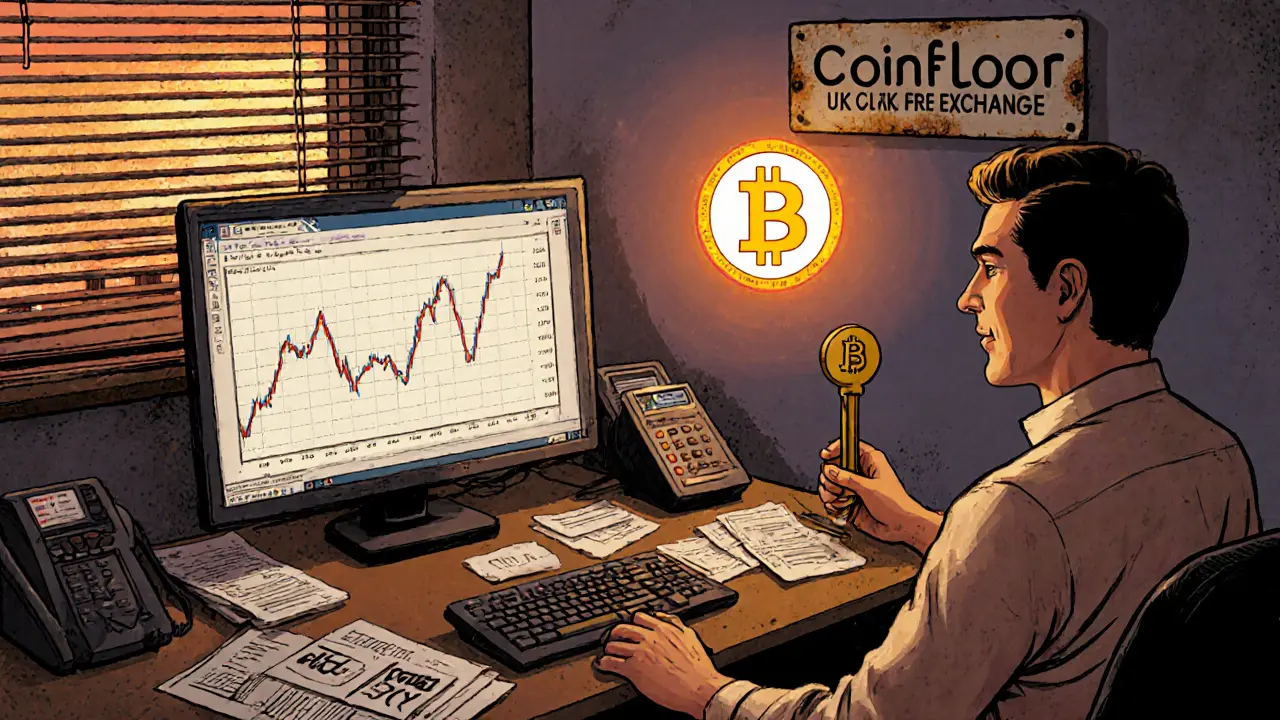Crypto Exchange Comparison Tool
Find your perfect exchange
Compare popular crypto exchanges based on your needs. Select what matters most to you to see which platforms meet your requirements.
Coinfloor was once the UK’s biggest Bitcoin exchange - now it doesn’t exist
If you’re looking for a reliable place to buy Bitcoin in the UK, you might come across old forum posts or YouTube videos praising Coinfloor. Back in 2018, it was the go-to exchange for British crypto buyers. Simple interface. No credit card fees. All funds stored offline. And it was the first exchange in the world to let users verify its Bitcoin reserves on the blockchain - a move that earned serious trust from early adopters.
But here’s the catch: Coinfloor stopped operating on October 4, 2021. Not because it got hacked. Not because it went bankrupt. But because it lost the race to stay relevant.
Today, if you type “Coinfloor” into your browser, you’ll be redirected to CoinCorner. That’s not a coincidence - Coinfloor was absorbed into CoinCorner, and all customer accounts were moved over. There’s no more Coinfloor. No trading. No deposits. No support. Just a quiet exit after eight years of being a pioneer.
Why Coinfloor mattered in the early days
Coinfloor launched in 2013, right when Bitcoin was still a fringe experiment. Most people didn’t know what a wallet was. Exchanges were sketchy. Some vanished overnight. Coinfloor stood out because it played by the rules.
It was registered as a Bureau de Change with HMRC - not the FCA, but enough to signal legitimacy in the UK’s gray-area crypto landscape. It didn’t promise high returns. Didn’t list 100 coins. Just Bitcoin and later Bitcoin Cash. And it kept 100% of customer funds in cold storage. No hot wallets. No risky bets. That simplicity was its strength.
Its proof-of-solvency system was revolutionary. Customers could check the exchange’s Bitcoin balance on-chain, in real time. If Coinfloor claimed it held 1,000 BTC, you could verify it yourself. No third-party auditor needed. No guesswork. That transparency was rare in 2015 and still is today.
For UK users, it was the easiest way to buy Bitcoin with GBP. Bank transfers only. No credit cards. No PayPal. No crypto-to-crypto trading. Just buy BTC with pounds. Sell BTC for pounds. Done.
What you could and couldn’t do on Coinfloor
Let’s be clear: Coinfloor wasn’t a full-service exchange. It didn’t try to be.
- Supported coins: Only Bitcoin (BTC) and Bitcoin Cash (BCH). No Ethereum. No Solana. No Dogecoin. Not even Litecoin.
- Trading pairs: GBP/BTC and GBP/BCH only. No USD, EUR, or crypto pairs.
- Deposits/withdrawals: Bank transfers only. No card payments, no Apple Pay, no Revolut. You had to use a UK bank account.
- Fees: 0.30% per trade. Higher than Coinbase (0.25%) and Kraken (0.16% at the time). Withdrawal fee was 0.0005 BTC - cheaper than most.
- Minimum deposit: Around £50-£100, depending on account type. Higher than competitors.
- Platform: Basic web interface. No mobile app until late in its life. No charting tools. No limit orders. No margin trading. No API for bots.
If you were a beginner who just wanted to buy Bitcoin and hold it, Coinfloor was fine. If you wanted to day trade, use leverage, or switch between altcoins - you were out of luck.

Why users loved it - and why they left
Positive feedback came from people who valued safety over speed.
- Security: “I’ve used Coinfloor since 2016. Never had an issue. I sleep better knowing my BTC is in cold storage.” - G2.com user, 2023
- Transparency: “The proof-of-solvency feature made me trust them more than any other exchange.” - Reddit user, r/BitcoinUK, 2019
- GBP integration: “Finally, an exchange that doesn’t make me pay 5% in conversion fees.” - UK-based investor, 2020
But the complaints piled up too.
- Customer support: Only email and ticket system. No live chat. No phone. Responses took days. Polish and English only.
- Outdated features: “I asked for a mobile app in 2018. Got it in 2020. By then, everyone else had had one for years.” - Trustpilot review, 2020
- Low coin selection: “Why am I still stuck with BTC and BCH in 2021? Coinbase has 50+ coins. Why can’t Coinfloor just add Ethereum?” - Reddit thread, 2020
- Trustpilot rating: 2.2/5 based on 164 reviews. Most complaints were about slow support and lack of innovation.
The mismatch was clear: Coinfloor built a fortress for cautious users, but the rest of the market was building a theme park. People wanted more coins, faster apps, lower fees, and better tools. Coinfloor didn’t adapt.
The fatal mistake: refusing to evolve
Between 2017 and 2020, the crypto market exploded. New exchanges popped up daily. Kraken added 20+ new coins. Coinbase launched its own wallet, debit card, and staking. Binance became a global giant.
Coinfloor? It stayed the same.
It had the chance to expand. It had the capital. It had the reputation. But it chose to stay small. To stay simple. To stay focused on Bitcoin and GBP users.
That strategy worked in 2015. By 2020, it was a liability.
Deloitte’s 2020 Blockchain Survey found that exchanges with fewer than 10 supported assets lost market share at twice the rate of those with 20+. Coinfloor had two. It wasn’t just behind - it was invisible to new traders.
Even its regulatory edge faded. The UK’s FCA finally started regulating crypto exchanges under the Fifth Money Laundering Directive in 2020. Coinfloor was never licensed by them. It relied on its HMRC status - which wasn’t enough to compete with FCA-regulated rivals.
What happened on October 4, 2021
On that day, Coinfloor sent an email to every user:
“Coinfloor and CoinCorner have agreed to have Coinfloor’s customers migrate to the CoinCorner platform... We are working closely with the CoinCorner team to ensure a smooth transition for you.”
No drama. No panic. Just a quiet shutdown.
Users didn’t have to do anything. Their balances were automatically moved. Their trading history was preserved. Their GBP accounts were transferred. CoinCorner promised to honor existing fees.
It wasn’t a failure. It was a strategic exit. Coinfloor’s founders knew they couldn’t compete anymore. So they sold the customer base to CoinCorner - a smaller, similarly focused exchange that also only traded Bitcoin and BCH.
Today, CoinCorner still operates. It has a mobile app. It’s slightly more modern. But it’s still the same kind of exchange: simple, Bitcoin-only, UK-focused.

Is CoinCorner the same thing? Should you use it?
If you’re still looking for a Bitcoin-only exchange in the UK, CoinCorner is the closest thing to Coinfloor’s legacy.
- Pros: Still supports GBP bank transfers. Still uses cold storage. Still simple interface. Still no credit cards.
- Cons: Still only two coins. Still no advanced trading. Still no live support. Still no altcoins.
It’s not a bad choice if you just want to buy Bitcoin and hold it. But if you want to trade Ethereum, use a mobile app with charts, or get help in 10 minutes - look elsewhere.
For most people today, exchanges like Coinbase, Kraken, or Binance offer far more value. Lower fees. More coins. Better apps. Faster support. Even if you’re in the UK.
Final verdict: A relic of crypto’s early days
Coinfloor wasn’t a scam. It wasn’t a flop. It was a pioneer that got left behind.
It proved you could run a secure, transparent crypto exchange in the UK. It showed that simplicity could build trust. But in a market that moved faster than ever, standing still meant disappearing.
Its story isn’t about loss. It’s about evolution. The crypto industry doesn’t reward loyalty to the past. It rewards those who adapt.
If you’re reading this in 2025 and you’re still using Coinfloor - you can’t. It’s gone. And if you’re looking for a similar experience, CoinCorner is your only option. But be honest with yourself: Do you really want to be stuck with two coins and no app in 2025? Or is it time to move on?
Frequently Asked Questions
Is Coinfloor still operating in 2025?
No, Coinfloor ceased operations on October 4, 2021. All users were migrated to CoinCorner. The Coinfloor website now redirects to CoinCorner, and no trading, deposits, or support are available under the Coinfloor brand.
What happened to my money if I had an account on Coinfloor?
All customer balances were automatically transferred to CoinCorner in October 2021. You didn’t need to take action. Your Bitcoin and GBP balances were moved over, and your trading history was preserved. If you still have a Coinfloor account, it’s inactive - log in to CoinCorner instead.
Why did Coinfloor shut down?
Coinfloor shut down because it failed to keep up with market changes. While competitors added dozens of cryptocurrencies, advanced trading tools, and mobile apps, Coinfloor stuck with just Bitcoin and Bitcoin Cash. Its high fees, lack of customer support, and slow innovation made it uncompetitive. Rather than struggle, its owners sold the customer base to CoinCorner.
Was Coinfloor safe to use?
Yes, Coinfloor was considered one of the safest exchanges in the UK during its operation. It used 100% cold storage, multi-signature wallets, and two-factor authentication. It was also the first exchange to offer blockchain-based proof of solvency, letting users verify its Bitcoin holdings in real time. No hacks or fund losses were ever reported.
Can I still buy Bitcoin with GBP today like I used to on Coinfloor?
Yes, but not through Coinfloor. CoinCorner still offers GBP bank transfers for Bitcoin and Bitcoin Cash purchases. Other options include Coinbase, Kraken, and CEX.IO - all of which support GBP and offer more coins, better apps, and faster support. CoinCorner is the closest legacy alternative, but it’s not the only one.

This is such a classic case of a company dying from being too honest. They didn’t chase hype, they didn’t lie about reserves, they didn’t pump altcoins to get users hooked - and that’s exactly why they got crushed. The market doesn’t reward integrity anymore, it rewards spectacle. Coinfloor was a library in a world that now only reads TikTok summaries.
Let’s be real - Coinfloor didn’t die because it was outdated. It died because the crypto industry became a theme park where everyone wants a rollercoaster, and Coinfloor was the guy sitting on a bench with a thermos of tea, saying ‘I’ll just watch.’ And you know what? He was right. But nobody wanted to be right. They wanted dopamine. Now we have 500 coins that all do nothing, and no one can tell you where their BTC actually is. Coinfloor was the last honest man in a casino. And casinos don’t keep honest men around.
The transition to CoinCorner appears to have been executed with operational precision. No public outcry, no regulatory intervention, no liquidity crisis - merely a quiet, orderly migration consistent with fiduciary best practices. One must consider the implications of this model’s obsolescence in the context of evolving financial infrastructure. The absence of FCA licensing, while initially a strategic choice, ultimately rendered the entity non-compliant with emerging norms. The market’s preference for scalability over stability is not irrational - it is systemic.
Man… I miss when crypto felt like a community and not a casino 😔 But honestly? Coinfloor was like that one friend who never changed their phone case but always showed up when you needed them. Still, I get it - you can’t run a 2013 app in 2025 and expect people to stick around. CoinCorner’s got the app now, which is good. But I still check Coinfloor’s old forum posts sometimes… just to remember when things made sense. 🙏
Let’s not romanticize this. Coinfloor was a glorified bank teller with a Bitcoin sticker on it. Zero innovation. No API? No mobile app until 2020? That’s not ‘simple’ - that’s incompetence wrapped in virtue signaling. And don’t even get me started on their 0.3% fee when Kraken was at 0.16%. They weren’t principled - they were lazy. And now they’re a footnote. The fact that people still think this is a ‘tragedy’ is proof that crypto culture is still stuck in 2014. Grow up. The market doesn’t care about your nostalgia.
Okay but seriously - if you’re still using CoinCorner in 2025, you’re literally choosing to live in 2017. Why? Because you’re scared of learning something new? Coinbase has a debit card, staking, fiat on-ramps, and a 5-star app. Kraken has 100+ coins and 24/7 support. You’re not being ‘safe’ - you’re being stubborn. And let’s be real, if you’re not using a mobile app, you’re not even in the game anymore. This isn’t about Coinfloor - it’s about you refusing to evolve. And that’s the real tragedy.
i just wanted to buy btc and now its all gone?? like wth?? why did they just disappear?? 😭
Look - I used Coinfloor from 2015 to 2020. I didn’t trade. I didn’t speculate. I just bought BTC every month and held. And you know what? I never lost a cent. That’s more than I can say for half the exchanges out there now. Yeah, their app sucked. Yeah, support took a week. But I slept better knowing my coins were locked in cold storage and they weren’t gambling with them. CoinCorner’s not perfect, but it’s still the same DNA. If you’re not trading, if you’re just holding - you’re not behind. You’re just choosing a slower, quieter path. And that’s okay. The market doesn’t need everyone to be a day trader. Some of us just want to own a piece of the future without the chaos.
This article is too long. Coinfloor is gone. CoinCorner is there. End of story. Why so many words? People just want to buy Bitcoin. Not history lesson.
Hey, I just wanted to say - if you’re reading this and you’re still holding BTC from your old Coinfloor account, you’re not alone 😊 I did the same thing. I didn’t know how to move it, I was scared of messing up… but I just logged into CoinCorner and boom - everything was there. No drama. No fees. Just… there. It’s weird to think that this quiet, simple exchange was the only one I ever trusted. I still don’t use apps or trade altcoins - but I’m glad I didn’t have to lose my coins. Sometimes the slow ones win… just not in the way they expected.
Coinfloor’s exit wasn’t failure - it was dignity. They didn’t sell out to VCs. Didn’t pivot to NFTs. Didn’t promise moonshots. They just quietly handed their users over to a like-minded successor. That’s rare. Most companies would’ve tried to rebrand, fake innovation, or scam their way out. Instead, they chose integrity over growth. And now we’re left with a lesson: the market rewards spectacle, but history remembers those who stayed true. Coinfloor didn’t die. It graduated. And CoinCorner? It’s the student who inherited the values. Not the flashy new kid with the flashy app - the quiet one who still knows how to count.
Let’s cut the sentimental nonsense. Coinfloor wasn’t ‘principled’ - it was incompetent. If you can’t build a mobile app in 7 years, you don’t deserve to exist. And that proof-of-solvency thing? Cute. But it’s not a business model. It’s a gimmick for people too lazy to use blockchain explorers. The fact that people still defend this is why crypto is still stuck in the Stone Age. CoinCorner is barely better. The real winners? Exchanges that actually listened. The losers? The ones who thought ‘trust’ was enough. Spoiler: it’s not. The market doesn’t care about your feelings. It cares about utility. And Coinfloor had none.